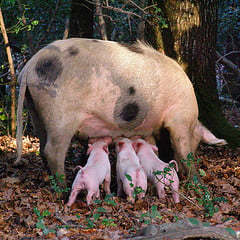 |
| Courtesy of Jim Champion Creative Commons BY-SA 2.0 |
When Eli Lilly ($LLY) bought Novartis Animal Health for $5.4 billion last year, it may not have known that it was picking up one product that the FDA had in its crosshairs: Denagard (tiamulin hydrogen fumarate) plus CTC (chlortetracycline hydrochloride), a medicated feed product for pigs. Now it knows, thanks to a warning letter sent earlier this month and posted on the agency's website. In short, the product is an antibiotic, and the FDA wants Lilly to stop marketing it for weight gain.
Denagard plus CTC is a feed additive approved to control some types of swine dysentery, as well as to treat bacterial enteritis and pneumonia. But in the letter--which oddly enough the FDA addressed to Novartis Animal Health in North Carolina--the agency contends that the product has been advertised on the Web and in promotional materials for improving weight gain and feed efficiency.
The FDA quotes several claims it uncovered in the promotional materials. "Denagard plus CTC-medicated pigs showed significantly higher daily gain and achieved a significantly higher body weight at the end of the trial period than OTC pigs (+3.9 lbs.) and nonmedicated pigs (+5.7 lbs.)," says one claim, according to the FDA's letter. "Denagard plus CTC provided a 4:1 return on investment," says another.
Because of those claims and others, Lilly is marketing Denagard plus CTC for uses not approved by the FDA and with a label that does not provide adequate instructions for proper use, the letter says. Therefore the product is "unsafe" and "adulterated" under the law. The agency has ordered the company to cease misbranding the product and to respond in 15 days with a written plan for complying.
A spokeswoman for Lilly's Elanco animal health unit says in an emailed statement that the company received the letter and is responding. "We are taking this matter very seriously," she says. "We have communicated our actions to-date to the FDA, which includes removal of promotional materials from the website and the process of removing them from circulation. We plan to respond to the FDA more thoroughly, including identifying any additional corrective and/or preventive actions necessary to resolve this matter."
The FDA's warning comes amid a renewed government effort to curb the improper use of antibiotics in food animals. Last year, the FDA began enforcing new guidelines imploring drugmakers to exclude terms like "feed efficiency" and "weight gain" from antibiotic labels. And the agency gave veterinarians the responsibility of deciding when antibiotics should be prescribed to food animals.
Whether these measures will make any difference has been a major point of debate, however. In March, the FDA said that a random sampling of milk from 2,000 dairy cows revealed that about a dozen antibiotics that aren't approved for lactating cows were still being used. And late last year, the Pew Charitable Trust released a report revealing that 66 of the 287 products that should fall under FDA's guidance still have labels that give farmers plenty of leeway when it comes to using antibiotics.
As for Denagard, critics had been griping to the FDA about the product since long before Lilly acquired it. Last summer, the advocacy group Keep Antibiotics Working filed a complaint with the agency pointing out that the website for the product unabashedly displayed charts showing how effectively the antibiotic fattened up pigs.
- here's the FDA's warning letter